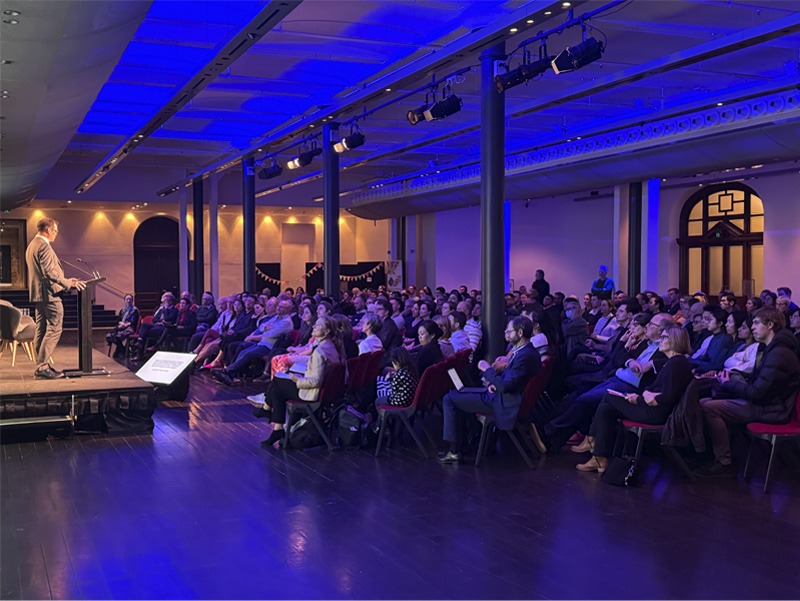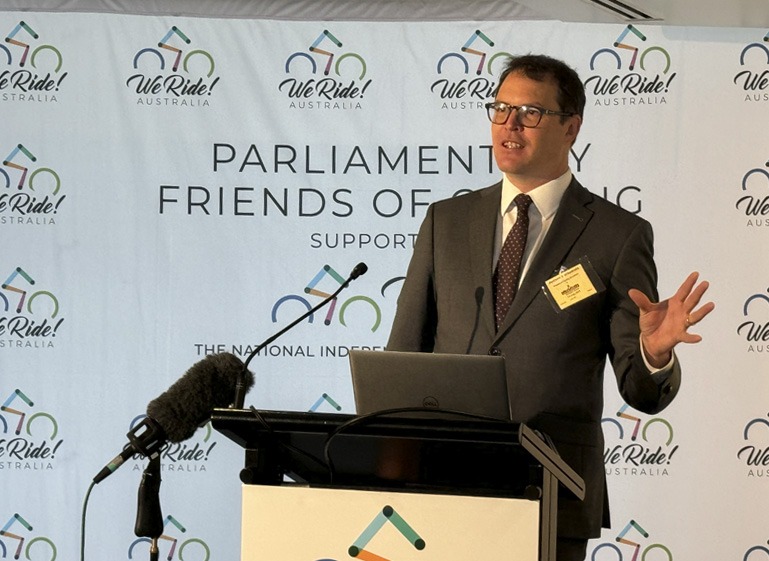Global Active Transport Pioneer Enlightens Audiences Australia-Wide

Canberra, ACT
Wales is a small country, whether you measure it by land area or population. It’s part of the United Kingdom, but usually overshadowed by its much larger neighbour, England.
But over recent years one politician in Wales has been making global news in relation to two “radical” policies in particular.
Lee Waters has been a member of the Welsh Parliament since 2016, but he made his biggest waves from 2018 until earlier this year when he was Deputy Minister for Economy and Transport, then Deputy Minister for Climate Change.
Two of his key headline making activities (in conjunction with his parliamentary colleagues) have been to change the default speed limit for local roads in Wales from 30 mph (50 kph) to 20 mph (32 kph) and to implement a radical review of upcoming major road building projects that saw the majority of them axed.
Lee recently visited Australia for a national speaking tour that included well-attended events in most Australian cities. I attended two of these, in Sydney and Canberra respectively.
The Canberra function was organised by the bicycle industry funded We Ride Australia. It was part of an ongoing series of Parliamentary Friends of Cycling breakfasts, held within the federal parliament house.
Unfortunately, despite the bike industry funding the event, only one attendee was representing the bicycle industry itself – Philip McGlade who is the Asia Pacific Managing Director of Trek. But the breakfast was well attended by the CEO’s and board chairs of cycling advocacy groups that represent most of Australia’s population, along with some key federal Members of Parliament (MP’s) and Senators.
“I know what it’s like to be a politician,” Lee told the audience. “You’re worried about the immediate and the things coming just after that. And doing things differently in the here and now is hard. So what we’ve done is we’ve put our carbon targets into law and broken them down into five year targets.
“Transport has been let of the hook in terms of carbon emissions reductions. There are things we can do immediately. And we know that the most effective thing you can do is active travel investment.”
Of course, cycling is a key element of active transport, so Lee was implying investing in cycling, even if that was not the specific word he used on this occasion.
He continued, “I think we should be framing active transport, not as a leisure activity, nice to do on weekends, but as a day to day mode of transport.
“People will do what’s easy. If we simply appeal to people to be green heroes or tree huggers we will fail. What we need to do is to make it easy.
“For 70 years we’ve made jumping in a car the easiest way of getting around and other modes of transport more difficult.”
Lee is still in the Welsh Parliament, but no longer a Minister. During his tenure as a Minister the two activities he was best known for was a globally unprecedented review and subsequent drastic reduction of new road building projects and for lowering the national default speed limit from 30 to 20 miles per hour. Both of these achievements attracted global headlines and a huge level of attacks against him from parts of the media.

Don’t Build It, Then They Won’t Come!
First he discussed their reduction in new road construction projects.
Lee recalled his strategy, “We said, “How are our road projects pipeline consistent with our climate targets?” So I set up an independent panel to assess them against our climate targets. And sure enough many were not, so all but 15 of 50 projects were stopped. We are setting the bar higher, for when roads are the right answer.”
“As you can imagine, this brought lots of cries of pain. But when you looked under the bonnet of each scheme, many of them didn’t stack up.
“You can’t build your way out of congestion. When you build more capacity, you generate more demand.”

Lowering Speed Limits Has Saved Lives
Lee said that despite it’s revolutionary nature, reducing the number of new road projects did not generate as much opposition as he was expecting. But reducing speed limits was the opposite.
“We’ve had a situation since the 1930’s in the UK that in built up areas, the default speed limit it 30 miles per hour (50 kilometres per hour),” Lee explained.
“We said, “We’ll drop the default down to 20 mph (32 kph) and people can make the case to have exceptions to increase it to 30 mph, but where people and traffic are mixing, 20 mph is a safe speed. You’re five times less likely to die if you’re hit at 20 mph than you’re hit at 30 mph.
“It’s been done in London and Edinburgh and there’s good, robust evidence showing a consistent 40% fall in casualties.
“We’re not quite a year into the (lower) speed limit and there’s been a lot of protests, but the quiet majority are simply getting on with it. Average speeds are down.
“But the data is doing exactly what we thought it would do. We now have data for six months and it shows that overall casualties are lower than they were during covid. Deaths are down, casualties are down. This has paid for itself already. It’s been worth the (political) grief.”
